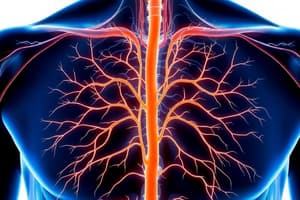Podcast
Questions and Answers
What does the somatic nervous system consist of?
What does the somatic nervous system consist of?
somatic motor neurons
The somatic nervous system usually operates under __________________________.
The somatic nervous system usually operates under __________________________.
voluntary control
What is the primary function of the autonomic nervous system (ANS)?
What is the primary function of the autonomic nervous system (ANS)?
regulates cardiac muscle, smooth muscle, and glands
The autonomic nervous system consists of autonomic motor neurons that regulate visceral activities by either___________________ in their effector tissues.
The autonomic nervous system consists of autonomic motor neurons that regulate visceral activities by either___________________ in their effector tissues.
What is biofeedback?
What is biofeedback?
The ANS can also receive sensory input from sensory neurons associated with ______________________.
The ANS can also receive sensory input from sensory neurons associated with ______________________.
What do interoceptors detect?
What do interoceptors detect?
The ANS consists of two main divisions: the ___________________ and the ___________________.
The ANS consists of two main divisions: the ___________________ and the ___________________.
What does dual innervation refer to?
What does dual innervation refer to?
By contrast, most autonomic motor pathways consist of two motor neurons in series; the first neuron is called the _______________________ and the second neuron is called the _______________________ .
By contrast, most autonomic motor pathways consist of two motor neurons in series; the first neuron is called the _______________________ and the second neuron is called the _______________________ .
What is the role of the autonomic nervous system?
What is the role of the autonomic nervous system?
What sources does sensory input for the somatic nervous system come from?
What sources does sensory input for the somatic nervous system come from?
How is motor output controlled by the somatic nervous system?
How is motor output controlled by the somatic nervous system?
What type of pathway do somatic motor neurons form?
What type of pathway do somatic motor neurons form?
Flashcards are hidden until you start studying
Study Notes
Somatic Nervous System
- Comprised of somatic motor neurons that innervate skeletal muscles, leading to muscle contraction when stimulated.
- Stimulation by somatic motor neurons results in excitation; lack of stimulation results in paralysis and loss of muscle tone.
- Operates under voluntary control, activated by motor areas of the cerebral cortex when a movement is desired.
Autonomic Nervous System (ANS)
- Regulates cardiac muscle, smooth muscle, and glands, collectively known as visceral effectors.
- Functions autonomously, allowing muscles and glands to operate even if the nerve supply is compromised (e.g., transplanted heart beating independently).
- Responds by either increasing or decreasing activities, exemplified by changes in pupil diameter or heart rate adjustments.
Sensory Input in the ANS
- Receives input from sensory neurons associated with interoceptors, located in blood vessels and organs that monitor internal environmental conditions.
- Interoceptors specifically detect internal stimuli and relay information to the ANS.
Divisions of the ANS
- Consists of two main branches: sympathetic nervous system and parasympathetic nervous system.
- Most organs receive input from both divisions, a phenomenon known as dual innervation where one division stimulates activity while the other inhibits.
Autonomic Pathways
- Most autonomic motor pathways are composed of two motor neurons in series: preganglionic neurons (CNS to ganglion) and postganglionic neurons (ganglion to effector).
- First neuron has a myelinated axon; the second neuron has an unmyelinated axon extending directly to target tissues.
- Chromaffin cells in the adrenal medulla secrete epinephrine and norepinephrine as part of some autonomic pathways.
Neurotransmitter Release
- Somatic motor neurons release acetylcholine (ACh) exclusively.
- Autonomic motor neurons have a more diverse output, releasing either ACh or norepinephrine (NE) depending on the target.
Summary of Key Functions
- The somatic nervous system is responsible for voluntary movements and direct control of skeletal muscles.
- The autonomic nervous system manages involuntary functions, ensuring homeostasis and response to internal changes.
- Both systems integrate sensory input to inform motor output, maintaining the balance of bodily functions.
Studying That Suits You
Use AI to generate personalized quizzes and flashcards to suit your learning preferences.



